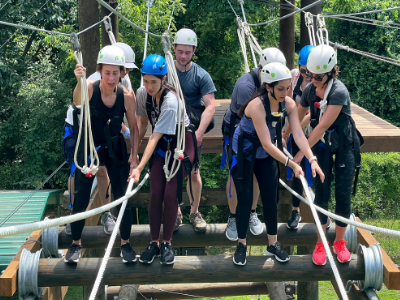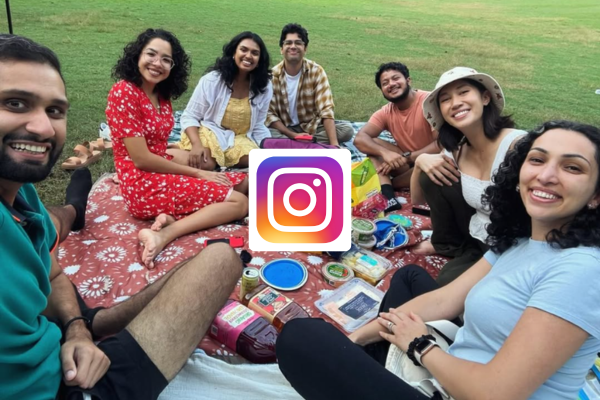
We strive to ensure that residents have a fulfilling experience with their clinical rotations and didactics leading to exceptional competence and satisfaction with their work. We believe that this satisfaction and excellence are best achieved when complemented by time and opportunities to enjoy values-consistent experiences outside of work as well. Therefore, we aim to foster a healthy work-life balance through a formal and informal support structures.
Our residents report that they are well trained and simultaneously able to maintain robust connections with family and friends, have time to explore Durham, and to pursue passions, hobbies, and fun.

“If I had to choose again, I would definitely choose Duke. I have consistently felt a strong sense of belonging in this residency program, made up of warm, curious, dedicated and intelligent psychiatrists! I am well-supported at all of my training sites and in my career planning. While I feel ready and fully prepared to be a practicing psychiatrist, I will miss being in this very special community.”
— Layne Walker, PGY4 Psychiatry Resident
Below you'll find highlights of some of the other key elements of the Duke Psychiatry & Behavioral Sciences residency experience.

Durham is an incredible place to live, work, train and more! But don’t take our word for it—see for yourself why we love the Bull City so much:
- Visit Duke’s website that showcases both the practical and fun aspects of living in Durham
- Visit the Discover Durham website
Visit our Life in Durham page to learn more about our dynamic city!
Hear from Residents
Current psychiatry residents share some of their favorite aspects of living in the Bull City and, more broadly, in the Triangle area and North Carolina.
Resident wellness is a huge priority in the Duke Psychiatry Residency, and we approach it from multiple directions, including community building, social activities, efforts to prevent burnout and increasing access to mental health treatment.
We are proud to be a supportive community that helps residents thrive both personally and professionally and maintain balance in their lives.
We also have a residency culture that embraces vulnerability, with faculty and leadership who model vulnerability for residents and work to create safe spaces where residents can be vulnerable with colleagues and mentors.
Support and Mentorship
- Frequent informal check-ins between program leadership and residents
- Monthly residency-wide meetings with program leadership
- Monthly class meetings with program leadership
- Big Sib/Little Sib Program (senior residents are paired with interns to facilitate social connections and supportive relationships within the residency)
- Resident mentorship program (each resident is paired with a training mentor)
- Weekly intern process group; monthly process group for PGY2; options for ongoing process group per class preferences
- Protected didactic time including lunch during Academic Half-Day for all four years
Hear from Residents
Current residents discuss different types of mentorship they're receiving through their psychiatry training at Duke.
A Culture of Vulnerability
- Intern orientation programming deliberately designed to facilitate class cohesion among interns and establish a safe community where interns can feel safe sharing vulnerabilities, knowing one another, and working together
- “Sharing Struggles” series, where faculty talk with residents about challenges they have faced in their careers or lives
- Educational workshops on self-compassion and physician well-being
Social and Community Building Events
- Intern orientation retreat
- Intern welcome party
- Resident-led social committee (organizing social Events throughout the year)
- Holiday events
- Annual winter party
- Active "Psychosocial Club"
- Annual resident retreat
- Annual party for trainees at department chair's home
Other Programmatic or Institutional Efforts
- Continuous quality improvement allows for adjustments to rotation and call schedules. We optimize for:
- Exceptional clinical rotations
- Strong mentorship and connection among residents and faculty
- Allowing residents time and space to pursue their interests within the field and outside of the field
- Elective opportunities with regular expansion and adjustments as new ideas arise
- Prioritization of excellence in psychiatry in the context of manageable work hours
- Aim to increase meaning in work through warm community and practical approach
- Reasonable and effective call and weekend responsibilities
- As much schedule flexibility as residency allows
- Wellness half-days (protected time away from clinical rotations)
- “Jeopardy” back-up system to cover residents who are ill, fatigued, or experiencing a family emergency
- Moonlighting opportunities starting as early as PGY2
- $500 per year academic stipend for each resident to use at their discretion
- Four weeks of vacation per year, with each resident guaranteed to have a week of vacation either during the winter holiday season
- Duke Personal Assistance Service (free assessment, short-term counseling and referrals for residents and their family members)
- Concierge GME Services to assist residents in accessing primary care appointments
- Psychiatry trainee lounges on Duke University Hospital and Duke Regional Hospital campuses
- Robust benefit package from Duke GME
Perks
- Free lunch during in-person Academic Half-Days
- Evening meal stipend for on-call residents
- Taxi transportation for fatigued residents
- Free access to fitness center exclusively for Duke trainees located in the hospital Duke Human Resources provides a number of additional wellness-related perks and benefits
- Free parking at all core rotation sites
What is it like to be a psychiatry resident at Duke? Five residents walk us through a typical week and share some of their favorite things about Duke and Durham. Check out these behind-the-scenes accounts of resident life!

If you really want to know what life as a Duke Psychiatry resident is like, check us out on Instagram!